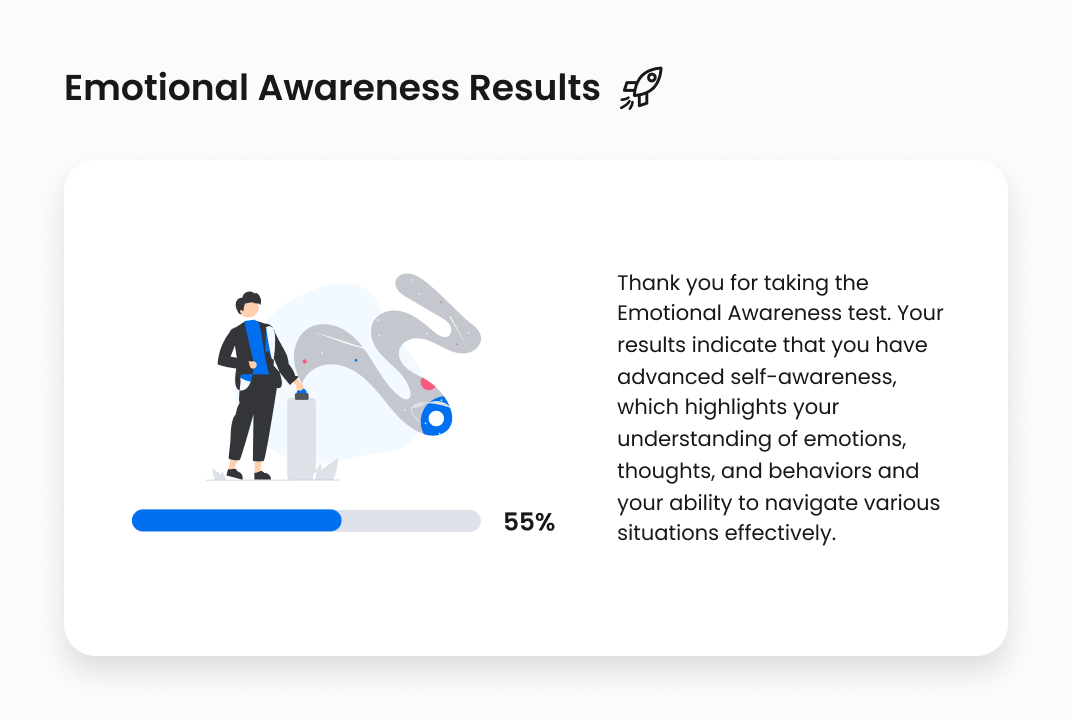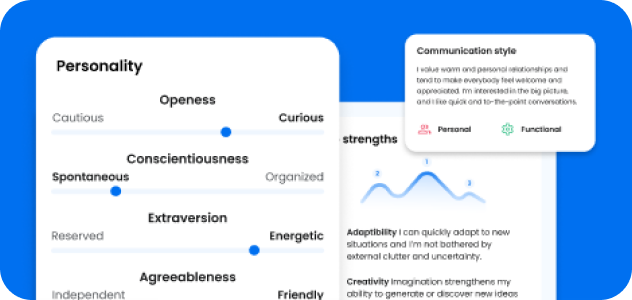Emotional Awareness Test

Explore your self-awareness and self-regulation skills
Benefits
The benefits of taking an Emotional Awareness Test include: Enhanced understanding of your emotions, how you react to them, and their influence on your behavior. Strengthened relationships: by better comprehending and managing your emotions, you can interact more effectively with others. Greater ability to handle stress and anxiety, promoting improved mental and physical well-being. Increased resilience in recovering from difficult situations and obstacles more rapidly and efficiently. Better decision-making: When you can control your emotions, you can make decisions with more objectivity and clarity.
Uncover your emotional awareness and self-regulation skills
How you can use this test?
How it works?
you’re at ease, undisturbed
and ready to focus.
you through the process. It’s
easy - just go with your gut
feeling.
you will receive your
feedback immediately
anyone, with just a click of a
button
What's Inside? Get immediate feedback by measuring these traits in you
Emotional Awareness Test
Assessment Insights
Scientific and Empirical Foundations
Introduction to emotional awareness: Lane, R. D., & Schwartz, G. E. (1987). Levels of emotional awareness: A cognitive-developmental theory and its application to psychopathology. American Journal of Psychiatry, 144(2), 133-143. Emotional awareness and emotional intelligence: Mayer, J. D., Caruso, D. R., & Salovey, P. (2016). The ability model of emotional intelligence: Principles and updates. Emotion Review, 8(4), 290-300. Emotional awareness in the workplace: Jordan, P. J., & Lawrence, S. A. (2009). Emotional intelligence in teams: Development and initial validation of the short version of the Workgroup Emotional Intelligence Profile (WEIP-S). Journal of Management & Organization, 15(4), 452-469. Emotional awareness training: Brackett, M. A., Rivers, S. E., & Salovey, P. (2011). Emotional intelligence: Implications for personal, social, academic, and workplace success. Social and Personality Psychology Compass, 5(1), 88-103. Emotional awareness and personal well-being: Barrett, L. F., Mesquita, B., Ochsner, K. N., & Gross, J. J. (2007). The experience of emotion. Annual Review of Psychology, 58, 373-403. Emotional awareness in interpersonal relationships: Feldman Barrett, L., & Gross, J. J. (2001). Emotion representation and regulation: A process model of emotional intelligence. In T. J. Mayne & G. A. Bonanno (Eds.), Emotions: Current issues and future directions (pp. 286-310). New York, NY: Guilford Press.
Emotional Awareness Test
Get StartedTry out our other tests
Our assessments are designed by top scientists
Frequently asked questions
What is the Self Awareness test?
Why is self-awareness important?
What is the Emo IQ battery?
The Emo IQ battery is a comprehensive assessment tool for measuring emotional intelligence (EI). This concept encompasses a range of abilities related to understanding, using, and managing emotions in oneself and others. The Emo IQ battery consists of three distinct tests, each focusing on a different aspect of emotional intelligence: Self Awareness, Empathy, and Emotional Management.
The Empathy test measures an individual's ability to understand and share the feelings of others. This involves recognizing others' emotional states, taking their perspective, and responding with an appropriate emotion to their feelings. Empathy is crucial for building strong, positive relationships and for effective communication.
The Emotional Management test assesses an individual's ability to manage and regulate emotions, particularly in stressful situations or when faced with challenges. This involves understanding how to manage one's own emotions, as well as positively influencing the emotions of others.


